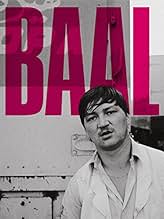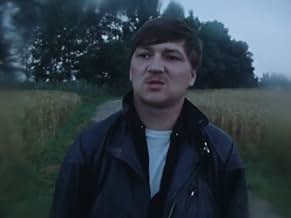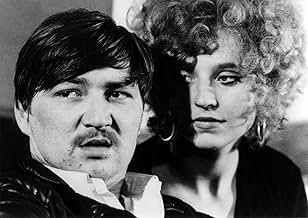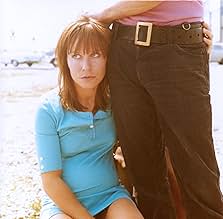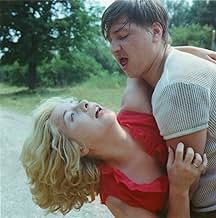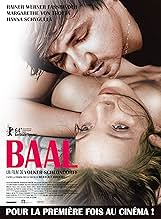Adicionar um enredo no seu idiomaBaal explores the cult of the genius, an anti-heroic figure who chooses to be a social outcast and live on the fringe of bourgeois morality.Baal explores the cult of the genius, an anti-heroic figure who chooses to be a social outcast and live on the fringe of bourgeois morality.Baal explores the cult of the genius, an anti-heroic figure who chooses to be a social outcast and live on the fringe of bourgeois morality.
- Direção
- Roteiristas
- Artistas
Carla Egerer
- Junges Weib
- (as Carla Aulaulu)
- Direção
- Roteiristas
- Elenco e equipe completos
- Produção, bilheteria e muito mais no IMDbPro
Avaliações em destaque
After about six minutes I felt the overwhelming urge to take a long, hot shower. Small wonder since after about five minutes of this crashingly dull, ugly, film I felt as if Bertolt Brecht, Volker Schlondorff and Rainer Werner Fassbinder had jumped through the TV screen, into my living room and collectively barfed all over me. I suppose I should have been honored, rather than repelled, to be in the cinematic presence of such poetic "genius" as that possessed by the title character. But I confess I was too busy being bored as hell by Baal's verbal effusions to register such feelings. Give it a generous D plus, mostly for Margarethe von Trotta's impressive bod.
BAAL has been on my cinema want list for 45 years and yesterday I finally got to see it at Lincoln Center courtesy of the FIlm Society in a restored version dated 2013. It was worth the wait.
Since its production in 1969 I have had the pleasure of meeting star RWF at the 1979 New York Film Festival (his distinctive black & white attire that night reproduced on the cover photo of the brochure accompanying the current FSLC series), and interviewed co-star Margarethe von Trotta twice during the '80s when she visited NYC to promote the debuts of films she had directed. I was a big fan of the New German Cinema movement, seeing as many films as I could by favorites including Wenders, Herzog, RWF, Schlondorff, later MVT, Reinhard Hauff, Georg Moorse, Edgar Reitz, Geissendorfer and Rufolf Thome. BAAL is a significant missing link.
Schlondorff presents his adaptation of a Brecht play as 24 numbered (and distinctly separate) scenes, and uses several other distancing techniques in the Brechtian mode. Real exteriors and interiors are used instead of studio sets, but the theatricality is retained in the physical stagings and (sometimes deadpan) line readings. Hand-held camera-work is frequently (but randomly) distorted by application of Vaseline-smeared lens to create a diffused, haloed image, a technique popularized at the time by the son/father filmmaking team of Jean- Gabriel & Quinto Albicocco in the classic adaptation of LE GRAND MEAULNES.
Though mis-classified as a TV movie by IMDb due to German network funding, BAAL is a cinema film, made and copyrighted in 1969. It does not resemble Schlondorff's work of the period, not his classical YOUNG TORLESS, his "hip" A DEGREE OF MURDER (memorably with Brian Jones score and starring Anita Pallenberg) nor his realistic POOR PEOPLE OF KOMBACH. Instead it is an in-your-face sort of rock opera.
Opening rock ballad utilizes spoken-word-poetry accompanied by hard rock music - ANIMALS' style organ and wailing harmonica, which later appears in the film occasionally to replace the dialog and background sound. (Music score is credited to jazz great Klaus Doldinger, though it doesn't resemble his output.) It has the effect of rap music, which if memory serves hadn't been invented yet (other than precursors like works by The Last Poets and Gil Scott-Heron).
We see Fassbinder as Baal in Scene 1 wandering as the ballad plays, and the relentless hand-held camera circles around him from all angles, occasionally looking first-person skyward. Oft-repeated theme of "The sky above, the mud below" (recall that classic '60s documentary film) is most memorably depicted later in Scene 10 when Von Trotta (as a stage actress named Sophie who Baal picks up for a tryst) writhes around pregnant in the mud by the roadside as Baal typically physically mistreats her and abandons her.
Scene 2 is also quite striking as Baal makes an ass of himself at the buffet of a fancy party celebrating his celebrity as a poet -he insults Mech (Gunther Neutze), a would-be publisher and benefactor, and is comically boorish to all and sundry.
We later meet a sort-of death's figure in Scene 4 as the musician Eckart (striking persona played by Sigi Graue), who pals around with Baal in an obvious love/hate relationship, and always is playing with a tuning fork. They form a trio with Sophie though at one point it is made clear that Baal and Eckart have a homoerotic relationship as well.
The dialog and ballads-over are relentlessly bitter and misanthropic in content, but watching the film is "fun" from a 2014 point-of- view, looking back on the anti-establishment '60s. Games of sadism, bondage and domination, which would figure prominently in Fassbinder's own films, dominate much of the action, often set in beer halls where Baal does his darnedest to pick fights with everyone.
In Scene 4 we meet barmaid Luise, played by future RWF regular Hanna Schygulla; and this is mirrored in Scene 20 when Von Trotta's Sophie returns to the film as Luise's replacement as barmaid with the audience far more surprised to see her resurface than the other characters on screen. Many other Fassbinder troupers appear in small roles, notably Irm Hermann in Scene 6 dominant as usual as a landlady who's upset when Baal is about to service two underage schoolgirl sisters, one of whom looked to me like a very young Eva Mattes, though I could not make a positive ID of her. Gunther Kaufmann, the black actor of innumerable RWF movies, appears as one of the barflies who gets to beat up Baal at one point.
Key subplot has an ill-fated romance of Johannes and 17-year-old Johanna, latter murdered and left in the river by Baal in one of his usual sociopathic escapades.
Though the female characters are mistreated throughout the film, Schlondorff repeatedly zooms in to see their plaintive expressions in closeup (notably Miriam Spoerri as the publisher's wife Emilie and Irmgard Paulis as doomed Johanna), clearly establishing them as sympathetic protagonists rather than mere horror-movie victims.
Film has several false endings (Scenes 22 and 23), played to the hilt for bathos as Baal lies pitifully dying and everyone makes fun of him. The parallels with the real-life RWF's fate as artist and self-destructive personality culminating in his own "death by dissipation" 13 years later make these scenes uncomfortable to watch but quite powerful. And Fassbinder's performance is commanding throughout.
Since its production in 1969 I have had the pleasure of meeting star RWF at the 1979 New York Film Festival (his distinctive black & white attire that night reproduced on the cover photo of the brochure accompanying the current FSLC series), and interviewed co-star Margarethe von Trotta twice during the '80s when she visited NYC to promote the debuts of films she had directed. I was a big fan of the New German Cinema movement, seeing as many films as I could by favorites including Wenders, Herzog, RWF, Schlondorff, later MVT, Reinhard Hauff, Georg Moorse, Edgar Reitz, Geissendorfer and Rufolf Thome. BAAL is a significant missing link.
Schlondorff presents his adaptation of a Brecht play as 24 numbered (and distinctly separate) scenes, and uses several other distancing techniques in the Brechtian mode. Real exteriors and interiors are used instead of studio sets, but the theatricality is retained in the physical stagings and (sometimes deadpan) line readings. Hand-held camera-work is frequently (but randomly) distorted by application of Vaseline-smeared lens to create a diffused, haloed image, a technique popularized at the time by the son/father filmmaking team of Jean- Gabriel & Quinto Albicocco in the classic adaptation of LE GRAND MEAULNES.
Though mis-classified as a TV movie by IMDb due to German network funding, BAAL is a cinema film, made and copyrighted in 1969. It does not resemble Schlondorff's work of the period, not his classical YOUNG TORLESS, his "hip" A DEGREE OF MURDER (memorably with Brian Jones score and starring Anita Pallenberg) nor his realistic POOR PEOPLE OF KOMBACH. Instead it is an in-your-face sort of rock opera.
Opening rock ballad utilizes spoken-word-poetry accompanied by hard rock music - ANIMALS' style organ and wailing harmonica, which later appears in the film occasionally to replace the dialog and background sound. (Music score is credited to jazz great Klaus Doldinger, though it doesn't resemble his output.) It has the effect of rap music, which if memory serves hadn't been invented yet (other than precursors like works by The Last Poets and Gil Scott-Heron).
We see Fassbinder as Baal in Scene 1 wandering as the ballad plays, and the relentless hand-held camera circles around him from all angles, occasionally looking first-person skyward. Oft-repeated theme of "The sky above, the mud below" (recall that classic '60s documentary film) is most memorably depicted later in Scene 10 when Von Trotta (as a stage actress named Sophie who Baal picks up for a tryst) writhes around pregnant in the mud by the roadside as Baal typically physically mistreats her and abandons her.
Scene 2 is also quite striking as Baal makes an ass of himself at the buffet of a fancy party celebrating his celebrity as a poet -he insults Mech (Gunther Neutze), a would-be publisher and benefactor, and is comically boorish to all and sundry.
We later meet a sort-of death's figure in Scene 4 as the musician Eckart (striking persona played by Sigi Graue), who pals around with Baal in an obvious love/hate relationship, and always is playing with a tuning fork. They form a trio with Sophie though at one point it is made clear that Baal and Eckart have a homoerotic relationship as well.
The dialog and ballads-over are relentlessly bitter and misanthropic in content, but watching the film is "fun" from a 2014 point-of- view, looking back on the anti-establishment '60s. Games of sadism, bondage and domination, which would figure prominently in Fassbinder's own films, dominate much of the action, often set in beer halls where Baal does his darnedest to pick fights with everyone.
In Scene 4 we meet barmaid Luise, played by future RWF regular Hanna Schygulla; and this is mirrored in Scene 20 when Von Trotta's Sophie returns to the film as Luise's replacement as barmaid with the audience far more surprised to see her resurface than the other characters on screen. Many other Fassbinder troupers appear in small roles, notably Irm Hermann in Scene 6 dominant as usual as a landlady who's upset when Baal is about to service two underage schoolgirl sisters, one of whom looked to me like a very young Eva Mattes, though I could not make a positive ID of her. Gunther Kaufmann, the black actor of innumerable RWF movies, appears as one of the barflies who gets to beat up Baal at one point.
Key subplot has an ill-fated romance of Johannes and 17-year-old Johanna, latter murdered and left in the river by Baal in one of his usual sociopathic escapades.
Though the female characters are mistreated throughout the film, Schlondorff repeatedly zooms in to see their plaintive expressions in closeup (notably Miriam Spoerri as the publisher's wife Emilie and Irmgard Paulis as doomed Johanna), clearly establishing them as sympathetic protagonists rather than mere horror-movie victims.
Film has several false endings (Scenes 22 and 23), played to the hilt for bathos as Baal lies pitifully dying and everyone makes fun of him. The parallels with the real-life RWF's fate as artist and self-destructive personality culminating in his own "death by dissipation" 13 years later make these scenes uncomfortable to watch but quite powerful. And Fassbinder's performance is commanding throughout.
In the early '80s, as a theater student, I did an entire semester on Bertholdt Brecht. We focused on better known works such as MOTHER COURAGE and CAUCASIAN CHALK CIRCLE, and spent a lot of time discussing how Brecht believed that audiences should not be pulled into sympathy or empathy for the characters, but to almost react to what he depicted in a "detached observer" manner. It was all interesting and very academic. One week, we spent two class sessions on BAAL. While some of the Brechtian characteristics were there already, it was different enough from everything else that we sort of put it aside. It was a difficult piece (so much poetry and so little plot) and I was happy enough to move on.
Now, decades later, Criterion releases the Blu Ray of this vaguely remembered play and I thought it would be a great chance to experience BAAL and also see a bit of Rainer Werner Fassbinder as an actor. Well, I got what I wished for. By now stretch of the imagination was this an enjoyable film to watch in any traditional sense. Essentially no plot. Just a focus on an "artistic genius" who used his notoriety to mis-treat everyone around him, particularly the women who inexplicably loved him. He scorns all who would embrace him. He abuses food and drink. He, frankly, is given no opportunity to show the viewer that he is anything other than a complete, dangerous pig. Fassbinder, hardly the epitome of a "leading man", throws himself into this depiction with frightening commitment...it's one of those performances where you wonder if the actor is really just playing himself or not. It's told in an episodic fashion, and while seemingly linear, it doesn't really have a plot. Just one encounter after another between Baal and the world & people around him. At no time is he sympathetic. He is a human interested in living like an animal...amoral, concerned only with his needs, and seeing other creatures only in how they can serve him.
Sound good? It gets better...director Volker Schlondorff films it all with handheld 16mm cameras, mostly out in fields and forests and often along the side of some random road. It feels SO homemade. At 84 minutes, it sometimes feels like it will never end. This movie absolutely should not work.
And yet. And yet. First of all, the character of Baal is pure and true. He never veers from the way he thinks life should be led. He has no regrets. He shows no love. Yet, as with an animal, he is very, very aware of nature around him. He speaks in metaphors that utilize images of the sky, the earth, the trees. And in the end, he finds that the squalor and deprivation of his life (compared to the way most of us would want to live) is beautiful. It's rare to encounter a character so lacking in compromise. He never violates his own code of ethics. They may be repugnant, but they certainly are steadfastly followed. And some of the dialogue is, literally, poetry and it has a kind of power only poetry possesses. And in the end, the film seems to be asking...was Baal really so bad, or was he just another kind of person altogether. Uncompromised and true to itself.
Fassbinder was magnetic. Gross, yes...but magnetic. And the rest of the cast, particularly the women, were very committed to their roles. The music, although very much of its time, is remarkably effective.
Then, on top of all this, Criterion has done a bang up job with it's "extras." There are supplements that talk about Baal & Brecht, and then their are segments that really delve into German New Wave cinema, and how the convergence of Fassbinder & Schlondorff & actor Hanna Schygulla (and even Brecht) all amounted to BAAL being a critical moment. It's all fascinating stuff for film buffs, including some excellent interviews with Schlondorff and others. Even the essay in the booklet is very worthwhile. I'd suggest planning to spend 3 hours with BAAL. See the movie, but then dive into the extras. It's a worthwhile, intellectually satisfying endeavor.
Now, decades later, Criterion releases the Blu Ray of this vaguely remembered play and I thought it would be a great chance to experience BAAL and also see a bit of Rainer Werner Fassbinder as an actor. Well, I got what I wished for. By now stretch of the imagination was this an enjoyable film to watch in any traditional sense. Essentially no plot. Just a focus on an "artistic genius" who used his notoriety to mis-treat everyone around him, particularly the women who inexplicably loved him. He scorns all who would embrace him. He abuses food and drink. He, frankly, is given no opportunity to show the viewer that he is anything other than a complete, dangerous pig. Fassbinder, hardly the epitome of a "leading man", throws himself into this depiction with frightening commitment...it's one of those performances where you wonder if the actor is really just playing himself or not. It's told in an episodic fashion, and while seemingly linear, it doesn't really have a plot. Just one encounter after another between Baal and the world & people around him. At no time is he sympathetic. He is a human interested in living like an animal...amoral, concerned only with his needs, and seeing other creatures only in how they can serve him.
Sound good? It gets better...director Volker Schlondorff films it all with handheld 16mm cameras, mostly out in fields and forests and often along the side of some random road. It feels SO homemade. At 84 minutes, it sometimes feels like it will never end. This movie absolutely should not work.
And yet. And yet. First of all, the character of Baal is pure and true. He never veers from the way he thinks life should be led. He has no regrets. He shows no love. Yet, as with an animal, he is very, very aware of nature around him. He speaks in metaphors that utilize images of the sky, the earth, the trees. And in the end, he finds that the squalor and deprivation of his life (compared to the way most of us would want to live) is beautiful. It's rare to encounter a character so lacking in compromise. He never violates his own code of ethics. They may be repugnant, but they certainly are steadfastly followed. And some of the dialogue is, literally, poetry and it has a kind of power only poetry possesses. And in the end, the film seems to be asking...was Baal really so bad, or was he just another kind of person altogether. Uncompromised and true to itself.
Fassbinder was magnetic. Gross, yes...but magnetic. And the rest of the cast, particularly the women, were very committed to their roles. The music, although very much of its time, is remarkably effective.
Then, on top of all this, Criterion has done a bang up job with it's "extras." There are supplements that talk about Baal & Brecht, and then their are segments that really delve into German New Wave cinema, and how the convergence of Fassbinder & Schlondorff & actor Hanna Schygulla (and even Brecht) all amounted to BAAL being a critical moment. It's all fascinating stuff for film buffs, including some excellent interviews with Schlondorff and others. Even the essay in the booklet is very worthwhile. I'd suggest planning to spend 3 hours with BAAL. See the movie, but then dive into the extras. It's a worthwhile, intellectually satisfying endeavor.
Rainer Werner Fassbinder abuses everyone and everything, including himself. Beautiful women adore him.
Dealing with the works of Bertolt Brecht is largely an issue of whether you agree with him before the show starts, or not. If you do, you'll like it.... most of the time. If not, then never, because Brecht held that there should be nothing in the work to rouse the observer's sympathy. Certainly writer-director Volker Schlöndorff and star Fassbender do what they can to honor that dictum in their translation of Brecht's seldom-performed work to the screen. Indeed, I will say that they have succeeded, but am left wondering whether it's an effort that should have been made. It's true that the new German cinema of the 1970s and 1980s looked upon humanity, and Western Civilization, as a blight upon the universe, but few of the practitioners save Herzog seem to me have managed more than an exercise in self-loathing.
Very well, you have convinced me you're loathsome. Now shut up and go away.
Perhaps that is why Brecht's widow stopped exhibition of this movie in any form. The ban was lifted in 2011 by Brecht's grand daughter. Perhaps she recognized the artistic value of this version, or perhaps she wanted the extra royalties it would bring.
Dealing with the works of Bertolt Brecht is largely an issue of whether you agree with him before the show starts, or not. If you do, you'll like it.... most of the time. If not, then never, because Brecht held that there should be nothing in the work to rouse the observer's sympathy. Certainly writer-director Volker Schlöndorff and star Fassbender do what they can to honor that dictum in their translation of Brecht's seldom-performed work to the screen. Indeed, I will say that they have succeeded, but am left wondering whether it's an effort that should have been made. It's true that the new German cinema of the 1970s and 1980s looked upon humanity, and Western Civilization, as a blight upon the universe, but few of the practitioners save Herzog seem to me have managed more than an exercise in self-loathing.
Very well, you have convinced me you're loathsome. Now shut up and go away.
Perhaps that is why Brecht's widow stopped exhibition of this movie in any form. The ban was lifted in 2011 by Brecht's grand daughter. Perhaps she recognized the artistic value of this version, or perhaps she wanted the extra royalties it would bring.
When you think that saw everything about bad pictures suddenly you bump into another rubbish production increasing the long list doomed to oblivion whereby they deserve stay there forever at trash can of cinema industry, stay tuned for forthcoming entries still buried that in near future like it or not will see the light, it's specifically the case of the outrageous "BAAL" that hurts the viewers in plenty way as never seen before.
Technically Baal never was released properly, just exposed by small audience in several private sessions aiming for be assessed by them, aftermaths the baffled watchers warned the producers forget the project otherwise it will be rejected by large majority would be became a huge flop, so just recently the filmmaker Volker Schlondorff has a nerve to recover it to release in a thematic box as really happened intitled at "New German Cinema".
A nasty leading cast Rainer Werner Fassbinder labeled a genius poet gone wild against the system becoming bitter and sleazy behavior, a sort of irreversible self-destruction process among it enters an unaware viewers that quickly perceive an unorthodoxy setting as art movie, we delve into an everlasting nightmare praying to reach at final, a kind of countdown where every single minute count, a true endurance test to the audience without any reward.
Thanks for reading.
Resume:
First watch: 2025 / How many: 1 / Source: DVD / Rating: 1.
Technically Baal never was released properly, just exposed by small audience in several private sessions aiming for be assessed by them, aftermaths the baffled watchers warned the producers forget the project otherwise it will be rejected by large majority would be became a huge flop, so just recently the filmmaker Volker Schlondorff has a nerve to recover it to release in a thematic box as really happened intitled at "New German Cinema".
A nasty leading cast Rainer Werner Fassbinder labeled a genius poet gone wild against the system becoming bitter and sleazy behavior, a sort of irreversible self-destruction process among it enters an unaware viewers that quickly perceive an unorthodoxy setting as art movie, we delve into an everlasting nightmare praying to reach at final, a kind of countdown where every single minute count, a true endurance test to the audience without any reward.
Thanks for reading.
Resume:
First watch: 2025 / How many: 1 / Source: DVD / Rating: 1.
Você sabia?
- CuriosidadesThe widow of Bertolt Brecht, Helene Weigel, was extremely unsatisfied with this adaptation. On her behalf, the film was removed from public release. Only in 2011 the granddaughter of Brecht allowed the film to be restored and publicly shown (the restored version was released in 2014).
- ConexõesFeatured in Rainer Werner Fassbinder, 1977 (1977)
Principais escolhas
Faça login para avaliar e ver a lista de recomendações personalizadas
Detalhes
- Tempo de duração1 hora 27 minutos
- Mixagem de som
- Proporção
- 1.37 : 1
Contribua para esta página
Sugerir uma alteração ou adicionar conteúdo ausente


